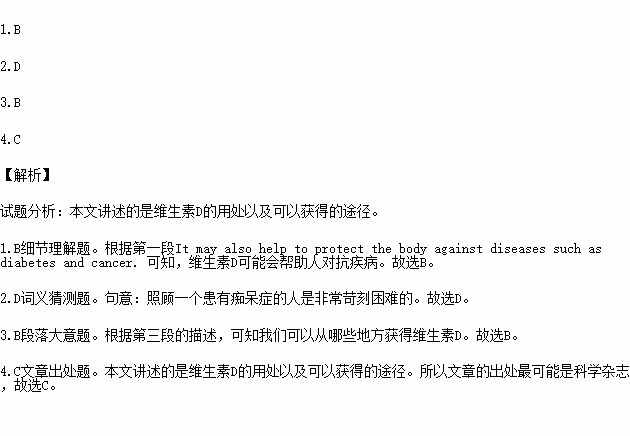题目内容
阅读下列短文,从每题所给的四个选项(A、B、C和D)中,选出最佳选项。
Health experts have long known that vitamin D is important for healthy bones and teeth. It may also help to protect the body against diseases such as diabetes and cancer. And now, researchers say vitamin D might help fight brain diseases called dementia (痴呆).
Dementia is a brain disease that damages thinking and memory processes, which scientists call “cognitive (认知) abilities.” Dementia is difficult to treat. Taking care of someone who has dementia is extremely demanding. And the disease is very frightening to sufferers. Chris Roberts suffers from dementia. He says the worst part of living with this disease was getting lost while driving. “The worst thing that I found was getting lost in the car, not just forgetting where I was going— I wouldn’t know where I was.” More than 47 million people around the world suffer from dementia. The World Health Organization reports that 60 percent of them live in low- and middle-income countries.
We get vitamin D from some foods like nuts, lentils (扁豆) and fatty fish. We also get vitamin D from the sun. But that is not dependable. In some parts of the world, there is not enough sunlight to provide enough vitamin D. Also, sunblock prevents the vitamin from entering the body. To add to the problem, the skin’s ability to process vitamin D weakens as a person ages.
Researchers at Rutgers University in New Jersey are exploring the relationship between vitamin D and dementia. The team recently measured vitamin D levels and cognitive ability in older people. Nutritional sciences professor Joshua Miller led the team. He said cognitive abilities differed among the study subjects. He said tests showed that about 60 percent of the group was low in vitamin D.
1.Which of the following is true about vitamin D?
A. Vitamin D can decrease people’s risk of heart diseases.
B. Vitamin D helps the body fight against cancer.
C. Vitamin D is mainly obtained from the sun.
D. The need for Vitamin D decreases as people age.
2.What does the underlined word “demanding” mean in Paragraph 2?
A. Boring but rewarding.
B. Disturbing and frightening.
C. Disgusting and stressful.
D. Hard and tiresome.
3.What does Paragraph 3 mainly talk about?
A. How vitamin D affects people’s health.
B. Where people get vitamin D.
C. Whether sunlight can produce vitamin D.
D. Why people’s age influences the production of vitamin D.
4.Where can we most probably read the passage?
A. In a travel brochure.
B. In a literature magazine.
C. In a science journal.
D. In a commercial advertisement.

